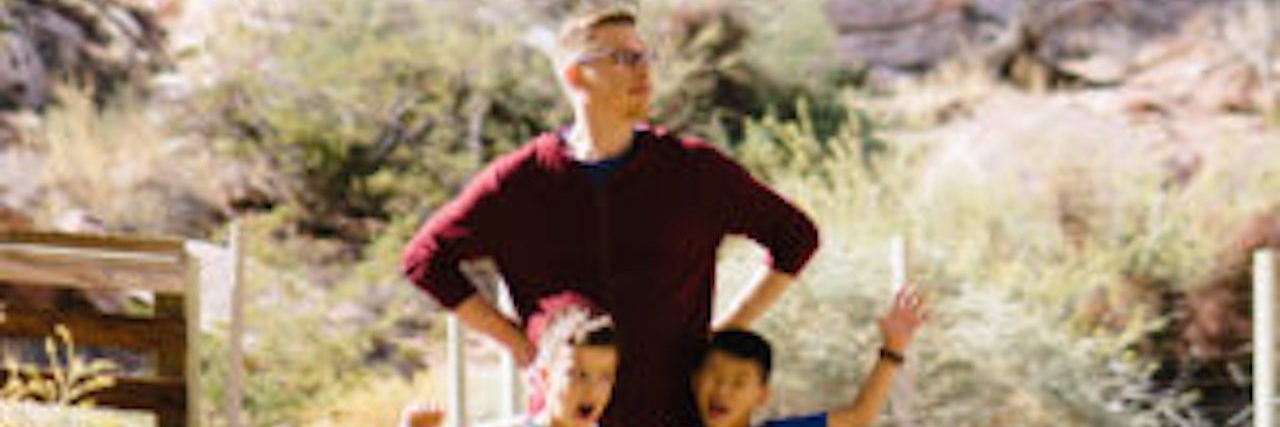9 Things I've Found Helpful as a Heart Dad
Editor's Note
For Heart Dads new to congenital heart defect (CHD), feeling a little lost, or those not sure where they fit in the CHD world, Aaron Carpenter shares what he found worked best for him and his family after eight years on the CHD roller coaster. His tips might help you, too!
I am the dad of two kids, one with a complex congenital heart defect (CHD) and one with minor CHD combined with a rare airway disease. The kids like to say our family is two in 100, since every one in 100 babies are born with CHD.
Dads generally have two goals when it comes to their family: happiness and health. Heart dads are certainly in that group, but the process of obtaining and maintaining that second goal can be much more complicated. CHD is your own, often unfair and definitely unwanted, version of normal. You live by the calendar, whether it is doctor appointments, medication dosing, or interventions and surgeries. I like to say heart dads are regular dads with a lot more to remember.
The voices of heart dads are sort of quiet in the CHD community. If you’re anything like me, you’re an introvert who pays attention to data and isn’t so great with support groups or big picture ideas. I want to be just as involved and just as knowledgeable as the next heart parent, but how do I do that in the world of Facebook groups and blogs? It only took my wife and I eight years on the CHD rollercoaster to come up with a plan, a split of duties so to speak. We are both involved in ways that work to our strengths and preferences. Our sons see both of us doing work in the CHD sphere and we always come together as a family for local CHD activities.
Here are a few of the things I have found helpful along my heart dad journey, helping my kids to be happy and healthy, and somehow finding myself happy and healthy too:
1. Teach a new skill, game or trick.
Teaching your kids new things is fun and exciting for them, but it also helps promote a strong bond and connection with you, which is far more important than the rules of any game. I still remember when each of my boys could dribble a basketball, hold scissors the correct way, and especially when they learned to swim. And we are working on shuffling a deck of cards now, along with reading Harry Potter.
2. Compare scars.
It’s important for your child to know their scars don’t define who they are or who they will become, but it can also be something they have pride in. Show off any scars you may have so they can see how their own scars might change over time. When I was 12, I crashed my dirt bike and ended up with an emergency splenectomy and a scar the full length of my abdomen. This provided a great connection with my son after his first surgery and throughout his preschool-aged years.
3. Promote connections.
Promote a connection to any other family members who have heart disease, even if it is long-distance. Find other heart kids, teens or young adults so they have role models for different stages of their lives. Even though we know our kids are one in 100, at times they can surely feel like they are the only ones going through this. My father-in-law had open-heart surgery shortly after my youngest son’s Glenn surgery. It was very touching when he removed his shirt so that he could compare his scar to my son’s over video chat. Even though their grandparents live across the country, they are bonded through their hearts with Pops and through gardening with Mimi.
4. Manage medications.
Know your child’s medications and dosing schedules inside out, backwards and on little to no sleep. Anytime there are changes to the medication schedule, be it sickness or higher doses as they grow, I build an Excel spreadsheet with the new dosing schedule. It gets printed and taped to the kitchen counter so that I can mark off doses when given. My spreadsheet was super handy during the weeks following my son’s Fontan surgery when meds are given around the clock. Sure there are apps for this, but doing the spreadsheet was my way of being involved and connected.
5. Attend medical appointments.
Attend every appointment you can, no matter how routine it is or how quickly it goes. Each interaction with your child’s clinicians is an opportunity to advance your knowledge on how to best care for you child. I think we all worry about our CHD kids growing up and taking over their own care. Start young and show them what staying in care looks like, which means us dads need to go to our own doctors, too!
6. Use your strengths.
I am an analytical computer nerd with a passion for physics, so I built the medication dosing spreadsheets and dove into the world of cardiology, until I learned everything that I could about my kids’ specific anatomy. Everyone is talented or passionate about something. The real trick is figuring out how to channel that energy into something that helps your family or the broader CHD community.
7. Have a strong partnership.
This is probably one of the most important things heart dads can do. The CHD journey is no joke, and having a solid relationship with your spouse, co-parent or significant other is crucial. Divorce rates among parents with medically-needy children are super high for many reasons, not the least is the incredible amount of stress. Whoever said that building a house together was a true test of a marriage never had kids with CHD. Talk to your partner, listen to your partner, go to counseling separately or together if needed. You are a team. Find other CHD dads; I have met a few other heart dads along this journey, from fatherhood veterans to fatherhood freshmen. There is a common bond between us because of CHD and no other dad has ever understood the gravity of seeing my son’s pink fingers and toes for the first time after Fontan surgery. Sometimes we don’t even talk about CHD or our kids but being together with those who truly get it is validating.
8. Take care of yourself.
Let’s face it, the CHD journey is a marathon that never really ends. If you don’t stop and decompress once in a while you are going to burn out. Find a hobby. Exercise. See your doctor every year for a physical and actually tell them how you are doing (I am still working at this). Please, take it from my years of doing so, don’t compartmentalize everything until you explode.
9. Get involved with the CHD community.
There are a lot of options once you are ready to take this step. Does your state have a PCHA chapter? Do other CHD organizations have a presence in your community? Do you have a skill you can lend to the broader CHD community? Will you send emails or make phone calls to your legislators, asking them to support key CHD measures? Can you visit Washington DC in February for lobby day? Do you want to just go bowling with other heart dads? Do it! Heart dad is a designation that I doubt any of us asked for, but it is a badge we proudly wear. It says we are fighting the CHD battle right alongside our kids, doing whatever it takes to keep them happy and healthy. Be proud of the work you are doing in your family. Tell people you are a heart dad, advanced “dadding” required.


